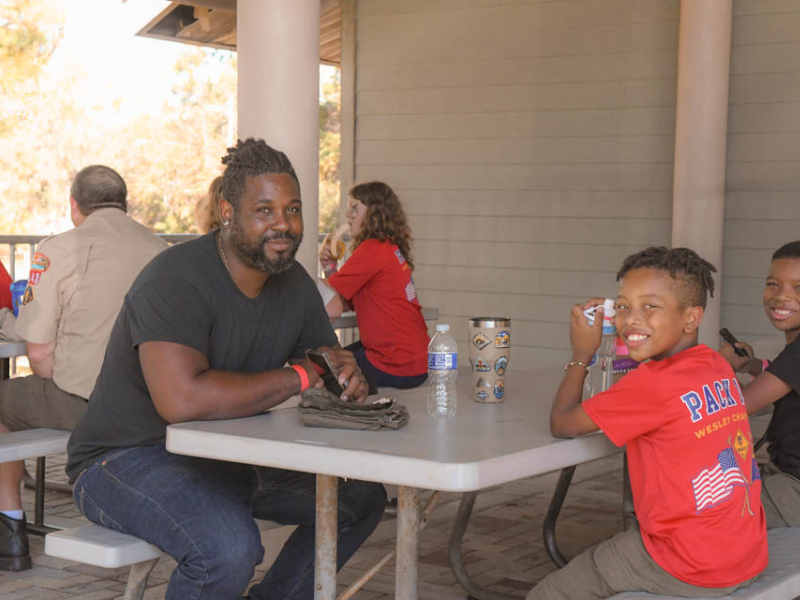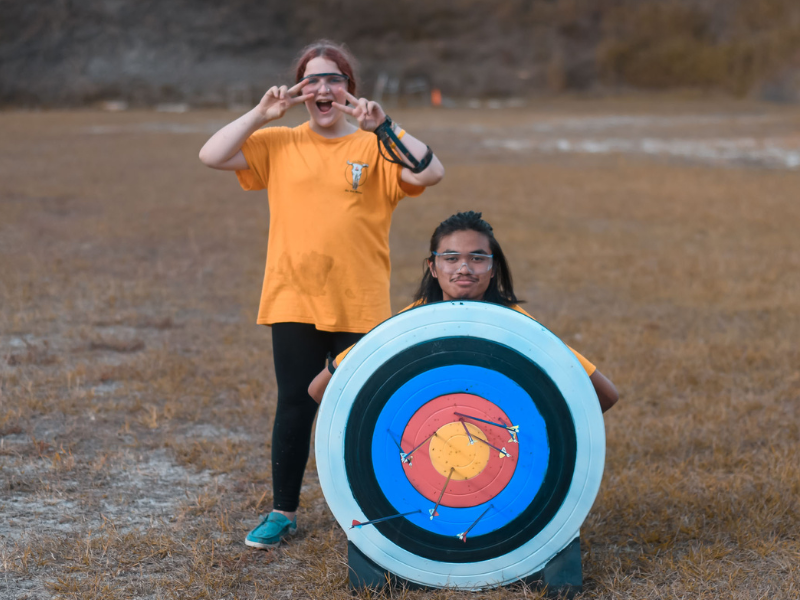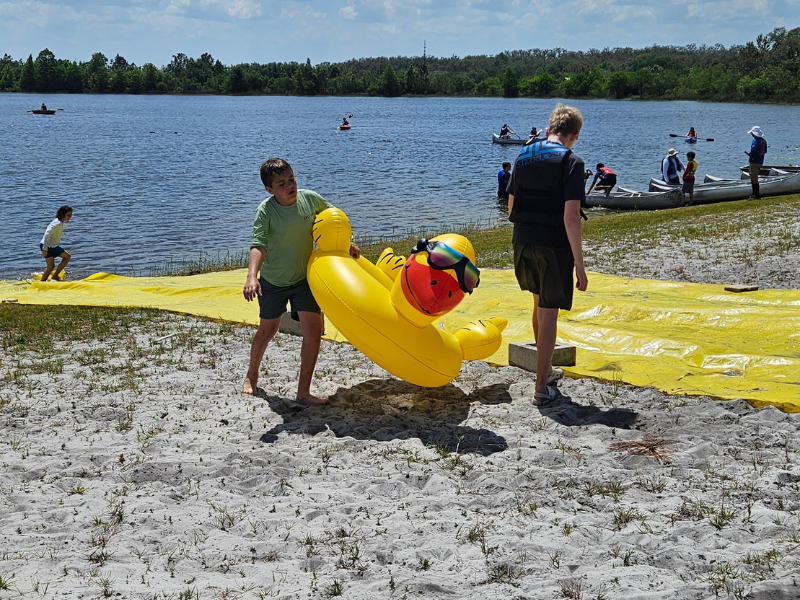Step 1: Goal Setting
For an event to be successful, goals must be established. We want to define what success for an event looks like.
Attendance: Every event should have an attendance goal and a target audience. Who you want to attend is as important as how many. This will help focus marketing and promotion.
Program: A program goal can be thought of as the answer to the question: “Why are we doing this event?” Program goals help to keep focus on the purpose of the event. Limit program goals to three or less; any more starts to get too complicated and spreads resources and attention too thin. Your program goal gives you something to measure all other tasks against.
Financial: Processing registrations and fees for an event are important services provided by the Greater Tampa Bay Area Council staff. This allows volunteers to focus on program and not administration. Every activity with expenses must have income in the form of activity fees. A budget for any event must be developed by the Volunteer Chair and the Scouting Professional. Budgets must have second level approval of a Field Director or the Director of Field Service before registration and promotion may begin. Budgets for events must be submitted in July for the following calendar year because they are part of the overall Council Budget. Unbudgeted events are not allowed.
Training Events: It is not required that events for basic training generate excess revenue (money left over after all expenses are paid). If one of these trainings involves extra expenses, such as food or recognition items, then a fee is expected to cover these expenses. Trainings that fall into this category: Position Specific Training, BALOO, Outdoor Leader Skills for Webelos Leaders, IOLS, District Committee training, or other BSA training provided at the district level. The “trained” patch and training cards are provided by the council.
Step 2: Logistics
Logistics involves the time, date, and location of an event, as well as the resources needed to support that event. The availability of a location is a factor when scheduling the time and date. Remember, “the early bird catches the worm.”
Location: Every activity site must be approved by the District Executive or Staff Advisor BEFORE any agreement can be made. Once the location is approved, the District Executive or Staff Advisor must be the one to sign any contractual agreement. Only a Scouting professional can enter into an agreement on behalf of the council. When securing a location, it is important to speak to both the person authorized to make decisions and the person who will be on-site during the event. This ensures that everyone understands the conditions of the agreement.
Date: Look at other calendars in addition to the council calendar before proposing a date. School calendars, community calendars and religious holidays are all important considerations. Check with council camping before planning to hold an event at any council camp property. Make sure you have time to develop a budget, gain budget approval, promote and make all other necessary arrangements for any event date you have in mind. If you are planning an event at a council camp, then you want to be certain you are part of the semi-annual calendar planning meeting.
Time: Think about how long the event is going to last and the best time to begin. Allowing travel time is important, especially when expecting participants from the far side of the council from the event.
Step 3: Authorization and Director Pledge (If Overnight Event or Day Camp)
Any Day Camp or any event that has an overnight component must have a trained Short Term Camp Administrator assigned to it. The administrator will work with the volunteer chair to make sure that the event is following all BSA procedures so that the event will be compliant with the BSA National Camp Standards. It is especially important to work with the Short Term Camp Administrator if the event is looking to add new activities.
Every Short Term Camp Director must also sign the Short Term Camp Director Pledge which outlines their responsibilities and important council guidelines.
Please review the GTBAC Short Term Administrator Page for more information on the process.
Step 4: Backdating
Backdating is a method used by the Boy Scouts of America to plan and organize events. This method takes the action items necessary for success and places them in chronological order, providing a deadline for completion of each task. This process helps avoid missed promotion opportunities important to success. Scouting Professionals can provide a backdating schedule.
Step 5: Budget
Each event that brings in or spends money must have a budget. The budget should be developed by the Chair and Scouting Professional. Budgets are completed in the late Summer and Autumn for the following calendar year. The budgets will go through a review and approval process. Adding a new event budget after the official budgeting process for the year requires the Scouting Professional to get approval by the Director of Field Service.
Promotion and registration will not begin, and fliers will not be produced or distributed until an approved budget is in place.
Building a budget starts with listing expected expenses, using estimated costs that could be a little higher to be conservative. Once all expenses are totaled, including any rentals and cleaning supplies, begin calculating the participation fee. If the event has occurred previously, take determined what 80% of the previous attendance was and divide the expense total by this number. All budgets must plan for at least a contingency and a Council Cost of Business as excess revenue. These are percentages of gross revenue and they are calculated each year. For 2024, the contingency is 10% and the Council Cost of Business is 12%. If your event utilizes program areas or buildings at Council Camps, there are costs associated with that as well.
Your Scouting Professional can provide a budget worksheet that details all of the needed expenses as well as suggested costs for most expenses.
Step 6: PROMOTE and PROMOTE
With an approved plan and budget, it is time to get the word out! Help is available through the council Marketing Specialist but the primary responsibility for marketing an event falls to the volunteers running the event. The volunteer chair is responsible for getting the attendance for the event. The council can provide:
- Posting to the council Social Media Accounts
- Providing the volunteers with Social Media Asset(s) to post on the volunteer and district pages
- Adding the event to the council calendar
- Adding the event to the appropriate area of the council website
- Help developing a marketing plan
Event Volunteers, working with the Scouting Professional may choose to design an event flyer.
Remember, all event flyers must be approved by the District Executive or Staff Advisor who is the Scouting Professional for the event. The Scouting Professional will submit the flyer to the Marketing Specialist for final approval. Only flyers for budgeted events, with reservations (if using Council property) and established online registration information will be approved.
Distribute promotional fliers at roundtable, district trainings, and district events.
Event fliers are to be one-page only and should include the date, time, location, a general event description and the event webpage URL for additional details.
Marketing Plan
In Step 1, you identified who you expect to addend your event. NOW it is time to market directly to them. A detailed plan, and executing that plan is crucial to reaching your target audience. The most successful plan puts the exciting and critical information about your event in front of your audience at least 5 to 7 times. Direct mailing (email to save on cost), inclusion in district / council email reminders, Roundtable promotion, unit visitations, websites, social media, phone calls, and personal contacts are all effective promotion strategies. Don’t just use one…use them all!
All details about district events (e.g., what to bring, program, rules, schedule, contact info) are to be posted on the District Webpage of the Council Website (not as a downloadable document or printed and distributed to leaders) for the following reasons:
- Saves trees
- Decreases the possibility of inconsistent messages distributed in printed guides vs. posted on the event webpage
- Drives target audience to one consistent place
- Content is more obvious on the website when a document doesn’t have to be downloaded, especially for parents
- Friendlier web navigation for desktop and mobile users
- Speeds up access to information for users (documents don’t have to be downloaded)
- Allows for making updates quicker/easier – Scouting Professional can coordinate change with website administrator
- Avoids the “I didn’t see the document” excuse since the information on the site is always available
Step 7: Recruit Staff / Committee
Don’t do it alone! District committees can help identify volunteers. The Commissioner Staff and Unit Leaders can provide leads as well. For council level events, members of the Council Program Committee can often help; utilize the event Scouting Professional serving as the Staff Advisor to assist with contacts as needed. Volunteers looking to engage community leaders can work with their District Executive or Staff Advisor for networking opportunities.
Typically, event staff is needed for logistics, program, food, health and safety, and backup staff to assist. The Scouting Professional serves as the finance chair for the event.
Remember that Council Events (All Training, Special Events, and Program Events) require prospective lead volunteers to be approved. Please gain approval prior to recruiting a volunteer for a position. The Scouting Professional will present the list of prospective event volunteers for approval.
Step 8: The Event
During the event, the Chair and Scouting Professional (District Executive or Staff Advisor) should not have responsibilities for a specific task. They are responsible for going surveying the event by visiting program areas and ensuring a quality experience for participants. Notes should be taken about things that are great and not-so-great. All overnight events and day camps will have a Short Term Camp Administrator Assess the event while it is occurring.
For every event – all participants and staff must be checked in with the Council Electronic Registration System and proper safety identification protocols must be followed. Talk to your Scouting Professional for current procedures.
Step 9: Wrap-Up
After the event, a formal wrap-up meeting occurs. This meeting involves as many members of the event team as possible. The Scouting Professional takes notes about what to continue and what to improve. Wrap-up notes will be included in the event folder.
Once complete, the Scouting Professional and Chair work together to complete a physical notebook or electronic file with all relevant event information: record of staff members, copies of vendor invoices and purchase orders, the event flyer, event specifics from the website, final budget reflecting actual activity, and notes from the Wrap-Up.
The Scouting Professional is responsible for closing out the budget within 30 days of the last day of the event. See Purchasing for Events for more guidance about policies on reimbursing volunteers for their out-of-pocket purchases for events.



